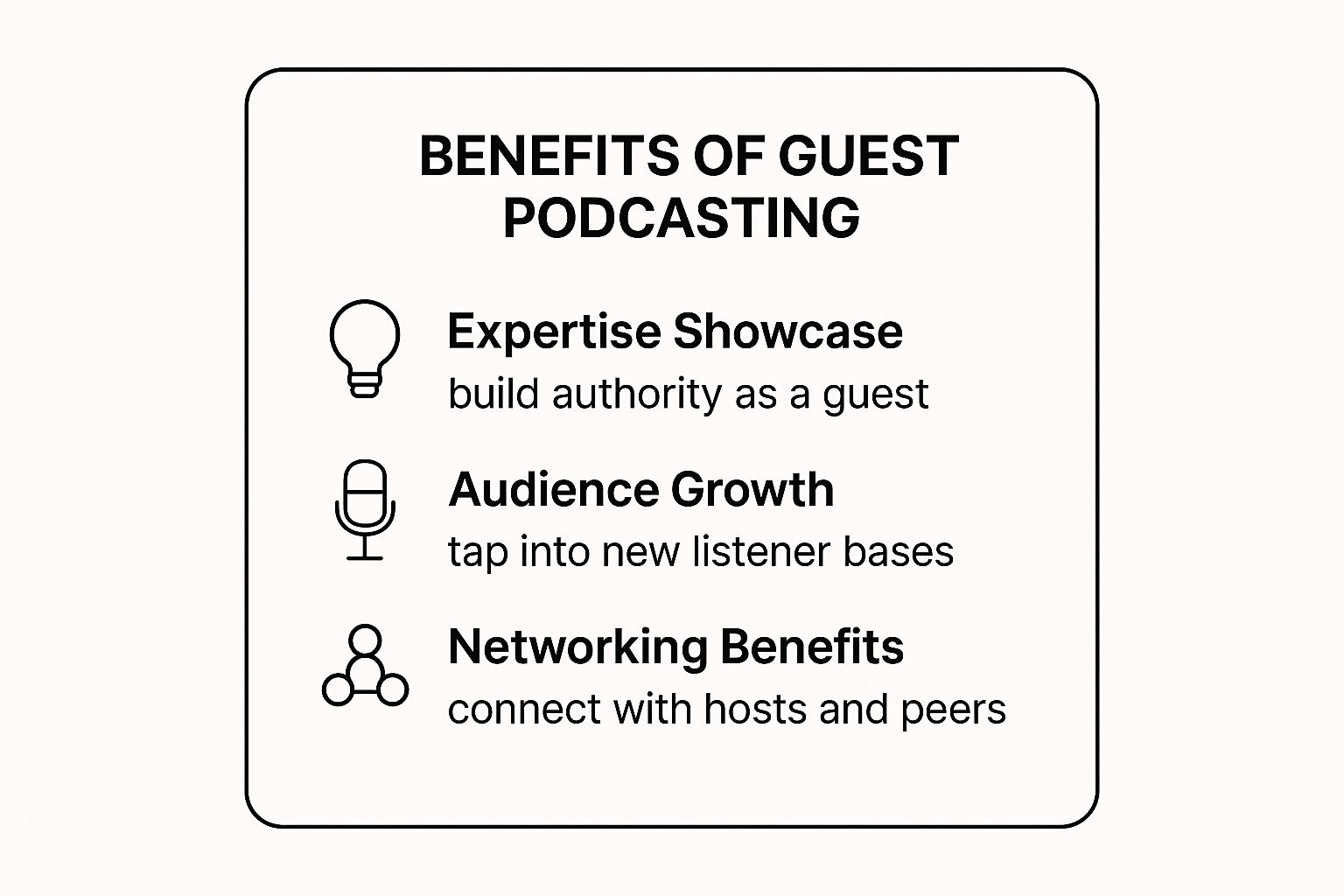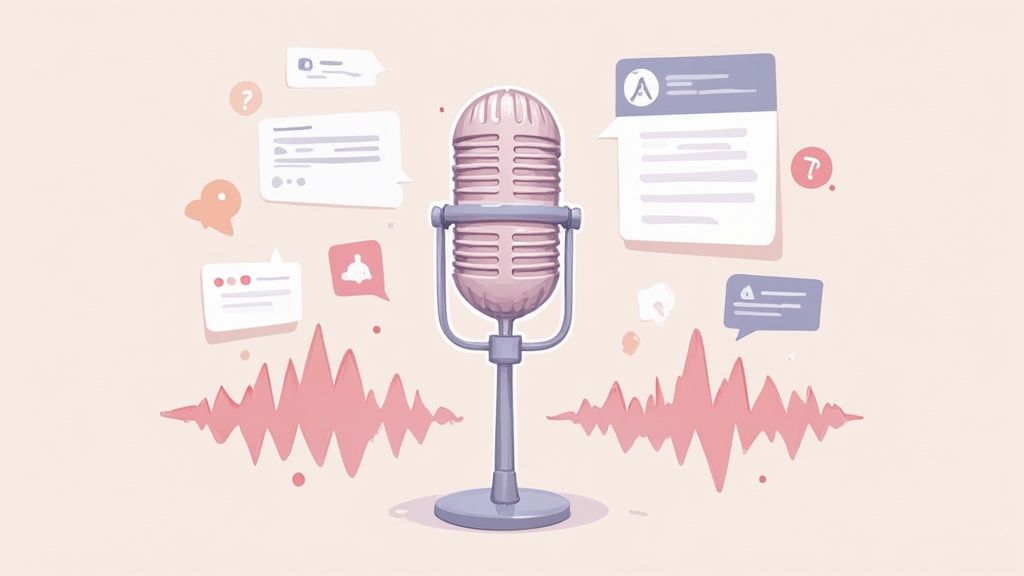Learning how to be a podcast guest is more than just a marketing tactic; it's a powerful way to build your brand from the ground up. I see it as a four-part journey: finding the right shows, crafting a pitch that actually gets read, preparing like a pro, and then, of course, delivering an interview that’s packed with value.
Nail these stages, and you'll find yourself connecting with new, highly engaged audiences in a way that most other channels just can't match.
Why Being a Podcast Guest Is a Smart Move
Jumping into the world of podcast guesting is one of the single best ways to build your brand and establish yourself as an authority in your space. This isn't just about getting your name out there. It's a strategic play to connect directly with niche communities that are actively looking for the kind of expertise you have.
The potential here is huge. The global podcast audience is absolutely booming, with forecasts pointing to over 630 million listeners by the end of 2025. Yes, there are more than 4.4 million podcasts out there, but that massive listener base means even shows with smaller, dedicated followings can put your voice in front of thousands of eager ears.
The Core Benefits of Guesting
Guest appearances are a direct line to audiences that have already raised their hands to hear about your topic. When a host invites you onto their show, you're essentially borrowing their hard-earned credibility. This gives you instant trust with their listeners—a powerful connection that’s incredibly difficult to build with traditional advertising.
This image really breaks down the main advantages you can expect.

As you can see, guesting helps you showcase your expertise, grow your audience, and build valuable professional networks—all at the same time.
The real magic of being a guest is the authentic connection. You're not an ad; you're a trusted expert having a real conversation. That's infinitely more powerful for building a lasting brand.
Beyond these obvious wins, there are plenty of other advantages that might surprise you. From sparking new collaborations to just getting a clearer handle on your own message, there's a lot to gain. We actually cover this in more detail in our article on the unintended benefits of podcast guesting.
The key is to treat every interview not as a one-off promotion, but as a long-term asset for your brand and career.
Securing great podcast appearances is a repeatable process. We've found that breaking it down into four distinct stages helps keep everything focused and effective.
The Four Pillars of Successful Podcast Guesting
Mastering these four pillars—Research, Pitching, Preparation, and Performance—is what separates a forgettable appearance from one that drives real results for your brand. Now, let's dive into how to execute each one.
Finding Podcasts Where You Belong

Alright, let's find your stage. Forget about just scrolling through endless podcast directories. The real goal here is to zero in on the exact shows where your expertise will be a lifesaver for the listeners. It’s about finding your people, not just any audience.
A great first move? Do a little ethical spying.
Look at competitors or peers you admire in your space. Where are they showing up as guests? A simple Google search for their name plus "podcast interview" can instantly give you a pre-vetted list of shows that are already hungry for topics in your niche.
This little trick tells you two critical things right away: the show is open to guests, and its audience is already warmed up to what you have to say.
Build a Tiered Outreach List
To keep your outreach from getting overwhelming, I highly recommend organizing your target podcasts into tiers. This strategy helps you rack up some early wins, build confidence, and create an interview portfolio before you go after the big fish.
- Tier 1 (Dream Shows): These are the heavy hitters. High-profile podcasts with massive, established audiences. They're tough to get on, but the potential reach is enormous.
- Tier 2 (Peer Shows): Think of podcasts with a similar audience size and authority level as your own brand. These are often the sweet spot and the easiest to land.
- Tier 3 (Emerging Shows): These are the smaller, up-and-coming podcasts in your niche. They usually have hyper-engaged communities and are perfect for honing your interview skills and gathering some social proof.
By starting with Tier 3 and 2 shows, you build the experience and credibility you'll need to successfully pitch the big names in Tier 1. Knowing how to get invited onto podcasts is often about laying this foundational groundwork first.
Don't get fixated on download numbers alone. Dig into the show's listener reviews and social media. Passionate comments and active discussions are a huge sign of a loyal community—the kind that will actually listen to and act on your message.
Confirm Audience Alignment
Just finding a show in your niche isn't quite enough. You have to be sure it's a true audience match. As of 2025, the largest group of podcast listeners globally are young adults aged 25–34. In the U.S., a staggering 55% of people over 12 have listened recently. Affluent professionals are also tuning in more and more, making guesting an incredible way to get in front of decision-makers. You can dig deeper into current podcast listener demographics on DesignRush to see if your target market is there.
To confirm the fit, use social listening tools like SparkToro or even just the advanced search features on LinkedIn and X (formerly Twitter). Search for keywords tied to your expertise. You're looking for hosts who are already talking about your subject matter. This makes your pitch feel less like a cold outreach and more like a relevant, timely conversation they're already having.
Crafting a Pitch That Hosts Can't Ignore
Let's be honest. Your pitch is your first impression, and most of them get deleted within seconds. A generic, self-serving email is the fastest way to get your name added to a host’s block list.
The secret to standing out is pretty simple: shift your mindset from "what can I get?" to "what can I give?"
A winning pitch is built on one core principle: demonstrate clear value for the host's specific audience. Instead of leading with your bio, lead with an idea. Show them you’ve actually listened to the show and you get who they're talking to.
Reference a recent episode or a recurring theme you've noticed. This simple act proves you aren't just blasting out a generic template to hundreds of shows. It shows you’re a fan who wants to contribute to the conversation, not just hijack it for your own promotion.
Personalize and Provide Value
Forget cold pitching strangers. The best podcast guest spots often come from building a relationship before you ever ask for anything. Interact with the host's content on social media. Share their episodes. When you finally do reach out, it feels more like a warm introduction, not a cold ask.
The goal of your pitch isn't to list your accomplishments. It’s to solve the host's biggest problem: finding amazing content for their listeners. Frame your expertise as the solution.
Your email needs to be concise and scannable. Podcast hosts are busy people. Make their decision to say "yes" as easy as humanly possible.
Your Pitch Must Include:
- A Clear Subject Line: Something like "Podcast Idea for [Show Name]" or "Guest Idea: [Your Topic]" works well. Keep it simple and direct.
- Proof You Listen: This is non-negotiable. Mention a specific episode you enjoyed and a quick "why" it resonated.
- 3-5 Unique Topic Ideas: Don't make the host do the heavy lifting. Offer tailored, compelling topics that fit their show format and hit on their audience's pain points. Each topic should sound like a can't-miss episode title.
- A Clear "Why You": Briefly, what unique experience or perspective do you bring to these topics? Why are you the perfect person to talk about this?
- A Link to Your One-Sheet: This is a pro move. A simple, one-page PDF with your headshot, short bio, sample topics, and links to previous interviews makes you look prepared and easy to work with.
This structured, value-first approach is the key to getting booked on podcasts consistently.
And a final tip: if you don't hear back, follow up once about a week later. A polite, brief nudge is perfectly acceptable and often appreciated. After that, move on. A great pitch respects the host's time, and that respect is often returned with a booking.
Preparing to Be a Memorable Guest

Getting booked on a show is a massive win, but the real work starts now. This is your chance to go from being just another guest to one they’ll be talking about for weeks—and asking to have back on.
First things first: your audio quality. Bad audio is the kryptonite of podcasts. Listeners will tune out in seconds, and you can bet the host knows this. You don't need a pro-level studio, but sounding like you're in a wind tunnel is a non-starter.
A decent USB microphone is a solid investment and won't break the bank. Even more crucial is your recording space. Find a quiet room. One with soft surfaces—carpets, curtains, bookshelves—is ideal for soaking up that dreaded echo. A walk-in closet packed with clothes works wonders. Do a quick test recording on your phone to make sure you sound crisp and clear.
Prepping Your Content and Stories
Once your tech is sorted, it’s time to think about what you’re actually going to say. Let me be clear: this does not mean writing a script. Please, never read from a script. It sounds robotic and completely kills the natural, conversational vibe that makes podcasts so powerful.
Your aim is to walk in with your key ideas and stories ready to roll.
- Do Your Homework: Listen to at least a couple of recent episodes. Get a feel for the host's personality, the show's format, and any recurring themes or in-jokes. What kind of questions do they typically ask? Who are they talking to?
- Outline Your Key Points: Come up with 3-5 core ideas you want to share. These aren't a rigid script, but more like signposts to help guide the conversation where you want it to go.
- Arm Yourself with Stories: People forget facts, but they remember stories. Have a few compelling, relevant anecdotes or case studies ready to go. They’re the best way to make your points stick and connect with the audience on a human level.
The goal is to feel confident and relaxed, not rehearsed. Solid prep work gives you the freedom to be fully present and engage in an authentic conversation that delivers real value. That’s what leaves a lasting impression.
Nailing this groundwork is what separates the good from the truly great guests. For a much deeper dive, check out our complete guide on how to prepare for your next podcast guest appearance.
Delivering an Interview That Gets You Invited Back

The recording light is on. This is where all your prep work pays off. It's your chance to turn a simple Q&A into a conversation that genuinely helps the listeners and makes the host look smart for having you.
The secret to a killer interview isn't just knowing your stuff; it's active listening. You have to tune in to what the host is really asking and where they're trying to steer the conversation. This is how you build real chemistry. The best guests make it feel like you're both discovering ideas together, not like you're just waiting for a gap to deliver your pre-planned speech.
When it's your turn to talk, wrap your points in stories. Nobody remembers dry data points. But they do remember a quick, relevant story or a case study that brings your idea to life. It makes complex topics feel simple and, frankly, way more interesting.
Handling Curveballs and Post-Interview Etiquette
No matter how much you prepare, a host might toss you a question from left field. Don't panic.
Just take a breath and say something like, "That's a great question, let me think about that for a second." It buys you a moment to gather your thoughts and shows you're being thoughtful, not just rattling off talking points. It makes you look composed, not flustered.
Being a high-value, low-maintenance guest is the secret to getting hosts to recommend you to their peers. Your goal is to be so good that they actively want to help you succeed.
Your job isn’t done when the mics are off. A truly great guest is also a great promotional partner. This is non-negotiable.
- Shoot over a thank-you note. A quick, personal email to the host thanking them for the chat is a small touch that makes a huge impression.
- Share the episode. A lot. When it goes live, promote it like it’s your own. Post it on your socials, send it to your email list, and put it on your website. Make sure to tag the host and the show.
This kind of follow-through shows you're a team player who cares about their show's success. It's the kind of thing that gets you invited back in a heartbeat.
And if you're just getting your feet wet, our guide on how to land your first podcast interview will walk you through those crucial early steps.
Your Podcast Guesting Questions, Answered
Jumping into the world of podcast guesting can feel like navigating a new city—exciting, but a little overwhelming. You've probably got a bunch of questions swimming around in your head. Let's tackle some of the most common ones I hear, so you can move forward with confidence.
Do I Really Need a Professional Microphone?
Honestly? No. While a fancy, high-end mic is a nice-to-have, it’s rarely a deal-breaker.
What hosts really care about is clean, clear audio. They'd much rather have a guest with a decent USB mic in a quiet room than someone with a $500 setup in a noisy coffee shop. Even the built-in mic on modern earbuds can work surprisingly well if you get the environment right.
The real game-changer is eliminating background noise and echo. Find a quiet room with carpet and curtains. My secret weapon for new guests? Record from a walk-in closet. The clothes do an amazing job of dampening sound. Your effort to deliver clean audio is what will make a host love you.
How Many Podcasts Should I Pitch at a Time?
This is a classic quality over quantity situation.
Sending 5-10 highly personalized pitches a week will get you much, much further than blasting out 100 generic emails. Taking the time to really dig into a show and explain exactly why you're a perfect fit for their specific audience is what lands you the interview.
A targeted pitch isn't just a tactic; it's a sign of respect. It shows the host you value their work and you're serious about contributing, not just promoting yourself. This approach helps you build real relationships, which are pure gold in the podcasting community.
What Should I Do After My Episode Goes Live?
Your job as a stellar guest doesn't end when the recording stops. Once the episode is live, it’s your time to shine and promote it like you mean it.
Share it across all your channels—social media, your company blog, your email newsletter. And when you do, always tag the host and the podcast. This sends more listeners their way and shows the host you're a genuine partner in making the episode a success.
This one simple step makes you incredibly memorable. It's the kind of thing that makes hosts recommend you to other podcasters in their network.
Is It Okay to Pitch a Podcast I've Never Listened To?
I'll be blunt: absolutely not. This is probably the biggest rookie mistake you can make, and hosts can spot a generic, unresearched pitch from a mile away.
You have to listen to at least one or two recent episodes. You need to get a feel for the show’s format, the host's style, and what the audience responds to.
Dropping a specific comment in your pitch—"I really loved how you unpacked [topic] with [guest] in episode 112"—is the fastest way to show you’ve done your homework. It instantly changes your pitch from a cold ask into a relevant, thoughtful suggestion.
Ready to make podcasting a core part of your B2B marketing strategy? At Fame, we specialize in producing authority-building podcasts that drive real business results. Learn more about our end-to-end production services at https://www.fame.so.

